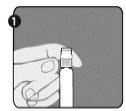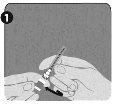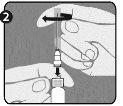
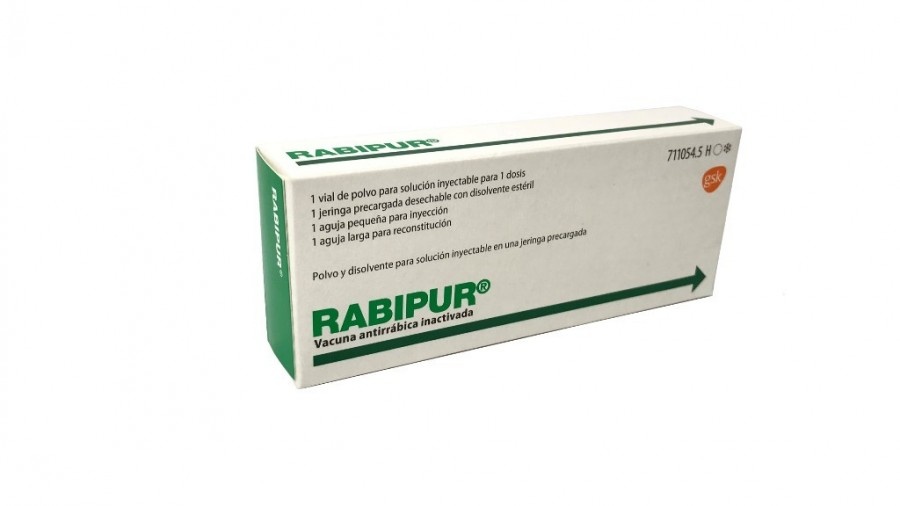
RABIPUR Pó e Solvente para Solução Injetável em Seringa Pré-carregada

Pergunte a um médico sobre a prescrição de RABIPUR Pó e Solvente para Solução Injetável em Seringa Pré-carregada

Como usar RABIPUR Pó e Solvente para Solução Injetável em Seringa Pré-carregada
Introdução
Prospecto: informação para o utilizador
Rabipur
Pó e diluente para solução injetável em seringa pré-carregada
vírus da raiva (inativado, cepa Flury LEP)
Leia todo o prospecto atentamente antes de si ou seu filho receber Rabipur, porque contém informações importantes para si.
- Conservar este prospecto, pois pode ter que relê-lo.
- Se tiver alguma dúvida, consulte o seu médico, farmacêutico ou enfermeiro.
- Esta vacina foi prescrita apenas para si ou para seu filho, e não deve ser dada a outras pessoas.
- Se experimentar efeitos adversos, consulte o seu médico, farmacêutico ou enfermeiro, mesmo que se trate de efeitos adversos que não aparecem neste prospecto. Ver seção 4.
Conteúdo do prospecto:
- O que é Rabipur e para que é utilizado
- O que precisa saber antes de si ou seu filho receberem Rabipur
- Como usar Rabipur
- Possíveis efeitos adversos
- Conservação de Rabipur
- Conteúdo do envase e informação adicional
1. O que é Rabipur e para que é utilizado
O que é Rabipur
Rabipur é uma vacina que contém o vírus da raiva que foi inativado. Após a administração da vacina, o sistema imunológico (o sistema de defesa natural do organismo) forma anticorpos contra os vírus da raiva. Estes anticorpos protegem contra infecções ou doenças causadas pelo vírus que causa a raiva. Nenhum dos componentes da vacina pode causar raiva.
Para que é utilizado Rabipur
Rabipur pode ser utilizado em pessoas de todas as idades.
Rabipur pode ser utilizado para prevenir a raiva:
- antes de um possível risco de exposição ao vírus da raiva (profilaxia pré-exposição)
ou
- após uma exposição suspeita ou comprovada ao vírus da raiva (profilaxia pós-exposição).
A raiva é uma infecção que pode ser transmitida quando um animal infectado morde, arranha ou até mesmo quando lamber uma pessoa, especialmente quando a pele não está intacta. Até mesmo o contato com armadilhas para animais que foram lambidas ou mordidas por animais infectados pode causar infecções nos humanos.
2. O que precisa saber antes de si ou seu filho receberem Rabipur
Si ou seu filho não deve receber Rabipur antes do possível risco de exposição ao vírus da raiva se:
- Têm antecedentes de reações alérgicas graves ao princípio ativo ou a algum dos outros componentes da vacina (incluídos na seção 6).
- Sofrem uma doença aguda que requer tratamento.
Devido à gravidade da infecção pelo vírus da raiva, pode ser administrado Rabipur a qualquer pessoa que tenha estado exposta à raiva, mesmo às grávidas.
Reações alérgicas graves (hipersensibilidade)
Se sabe que si ou seu filho corre o risco de sofrer uma reação alérgica grave à vacina ou a algum dos seus componentes, pode ser administrada a si ou a seu filho uma vacina antirrábica diferente que não contenha tais componentes. Se não houver outra vacina alternativa disponível, o seu médico ou enfermeiro conversará com si sobre os riscos da vacinação e da infecção pelo vírus da raiva antes de si ou seu filho receber a vacina.
Advertências e precauções
Em caso de doença aguda que requer tratamento, geralmente se adia a vacinação até pelo menos 2 semanas após a recuperação. A presença de uma infecção leve não requer adiar a vacinação. No entanto, consulte primeiro o seu médico ou enfermeiro.
Consulte o seu médico ou enfermeiro antes de receber Rabipur para a profilaxia pós-exposição se si ou seu filho:
- Têm alergia grave ao ovo ou a produtos derivados do ovo (para os sintomas, ver seção 4deste prospecto). Rabipur contém resíduos de proteínas de frango que restam do processo de fabricação.
- Têm alergia grave a antibióticos neomicina, clortetraciclina ou anfotericina B. Estes antibióticos podem estar presentes em quantidades muito pequenas na vacina.
- Têm alergia grave à poligelina.
Antes ou após qualquer injeção, pode ocorrer um desmaio, por isso deve informar o seu médico ou enfermeiro se si ou seu filho desmaiou em ocasiões anteriores após a administração de uma injeção.
Foram notificados casos de distúrbios muito raros, mas graves, que afetam o sistema nervoso após a administração da vacina Rabipur. Ver seção 4. Os medicamentos anti-inflamatórios (esteroides), que são frequentemente usados para tratar estes distúrbios, podem interferir na eficácia da vacina (ver abaixo, Uso de Rabipur com outros medicamentos). O seu médico ou enfermeiro decidirá como agir nestas circunstâncias.
Como todas as vacinas, pode ser que Rabipur não proteja completamente todas as pessoas que se vacinam.
Não se deve administrar a vacina nas nádegas, sob a pele ou em um vaso sanguíneo.
Outros medicamentos e Rabipur
Informar o seu médico ou enfermeiro se si ou seu filho está tomando, tomou recentemente ou pode ter que tomar qualquer outro medicamento, incluindo medicamentos sem prescrição. A menos que o seu médico indique o contrário, si ou seu filho deve continuar tomando da maneira habitual todos os medicamentos prescritos.
Se si ou seu filho sofre de deficiência do sistema imunológico ou se toma medicamentos que diminuem a imunidade do organismo contra infecções, ainda é possível administrar Rabipur; no entanto, pode ser que si ou seu filho não esteja tão bem protegido quanto outras pessoas. Neste caso, o seu médico ou o de seu filho pode solicitar análises de sangue após a administração da vacina para verificar se o organismo gerou anticorpos suficientes contra o vírus. Se necessário, si ou seu filho receberá doses adicionais da vacina (ver seção 3deste prospecto).
Rabipurpode ser administrado ao mesmo tempo que outras vacinas inativadas.Será usado um local de injeção diferente para cada tipo de vacina.
É possível que também seja necessário que si ou seu filho receba uma injeção deanticorpos contra a raiva(denominados “imunoglobulina antirrábica”) se si ou seu filho não foi completamente vacinado contra a raiva e é muito provável que tenha sido infectado pelo vírus. Nesse caso, será administrada a injeção de imunoglobulina antirrábica (que é administrada apenas uma veze geralmente com a primeira dose da vacina) e a vacina empartes diferentesdo corpo.
Gravidez e lactação
Se está grávida ou em período de lactação, acredita que possa estar grávida ou tem intenção de engravidar, deve receber a vacina antirrábica de qualquer forma se teve ou é provável que tenha tido contato com o vírus.
Também pode ser vacinado com Rabipur durante a gravidez ou o período de lactação e antes da exposição ao vírus, se se acredita que o risco de contato com o vírus é considerável. Neste caso, o seu médico conversará com si sobre os riscos da vacinação e da infecção pelo vírus da raiva e aconselhará sobre o melhor momento para se vacinar com Rabipur.
Condução e uso de máquinas
Alguns dos efeitos adversos que são descritos na seção 4deste prospecto podem afetar a capacidade de conduzir e utilizar máquinas.
Rabipur contém sódio
Este medicamento contém menos de 1mmol de sódio (23 mg) por dose, isto é, essencialmente “isento de sódio”.
3. Como usar Rabipur
Um médico ou enfermeiro que tenha recebido formação para administrar vacinas administrará Rabipur a si ou a seu filho. Deve estar disponível o tratamento que possa ser necessário para tratar os tipos muito graves de reações alérgicas que podem ocorrer após a administração da vacina (ver seção 4deste prospecto). A vacina deve ser administrada a si ou a seu filho em uma clínica ou consulta que tenha o equipamento necessário para tratar estas reações.
As instruções de reconstituição da vacina destinadas a médicos e ao pessoal médico estão no final deste prospecto.
A dose recomendada para adultos e crianças de qualquer idade é de um mililitro (1,0 ml) por dose.
O seu médico decidirá o número de doses que devem ser administradas a si ou a seu filho, com base em se si ou seu filho já recebeu Rabipur antes ou após qualquer possível contato com o vírus.
A vacina é administrada como injeção em um músculo (geralmente na parte superior do braço ou, em crianças pequenas, no músculo da coxa).
ANTES DE QUALQUER POSSÍVEL CONTATO COM O VÍRUS
Se si ou seu filho nunca foi vacinadocontra a raiva:
- Precisa receber 3 doses inicialmente. A primeira dose é administrada na primeira visita; a segunda dose é administrada 7 dias depois e a terceira dose 21 ou 28 dias após a primeira dose.
- Se si é um adulto entre 18 e 65 anos de idade que precisa de proteção rápida, também podem ser administradas três doses de Rabipur ao longo de 7 dias. A primeira dose é administrada na primeira visita; a segunda dose é administrada 3 dias depois e a terceira dose 4 dias após a segunda dose.
- Alternativamente, se si é uma pessoa com uma resposta imune normal, Rabipur pode ser administrado em duas doses ao longo de 7 dias. A primeira dose é administrada na primeira visita e a segunda dose 7 dias depois.
Se si ou seu filho não comparece a uma consulta para a administração de uma dose, deve marcar uma consulta o mais breve possível após a data programada inicialmente.
A necessidade de doses de reforço depende do risco de contato com o vírus da raiva. O seu médico consultará as recomendações oficiais sobre vacinação antirrábica e informará se é necessária uma dose de reforço.
Se si está em alto risco de infecção de forma contínuaé possível que o seu médico também peça que se faça periodicamente análises de sangue para determinar a quantidade de anticorpos contra a raiva presentes no sangue, a fim de que as doses de reforço sejam administradas o mais breve possível. A experiência indica que, geralmente, são necessárias doses de reforço a cada 2-5 anos.
APÓS UM CONTATO SUSPEITO OU COMPROVADO COM O VÍRUS
Pessoas vacinadas
Se si ou seu filho já foi completamente vacinado contra a raiva e/ou recebeu doses de reforço e esteve em contato com um animal que padece ou se suspeita que padece raiva, si ou seu filho precisará, por lo geral, de 2 doses adicionais da vacina (cada uma de 1,0 ml). A primeira dose será administrada o mais breve possível após o contato e a segunda 3 dias depois.
Pessoas não vacinadas
Se si ou seu filho não foi vacinado antes ou recebeu uma imunização básica inadequada, serão administradas 4 ou 5 doses (cada uma de 1,0 ml) seguindo uma das seguintes pautas:
- Se for usada uma pauta de imunização de 4 doses, as 2 primeiras doses da vacina serão administradas no dia 0, o mais breve possível após o contato, e, em seguida, serão administradas doses únicas nos dias 7 e 21 após a primeira dose.
- Também pode ser adotada uma pauta alternativa de 4 doses para pessoas saudáveis que se sabe terem uma boa resposta imune; a primeira dose será administrada o mais breve possível após o contato, no dia 0, e as outras serão administradas nos dias 3, 7 e 14 após a primeira dose.
- Se for usada uma pauta de imunização de 5 doses, a primeira dose da vacina será administrada no dia 0, o mais breve possível após o contato, e as demais serão administradas nos dias 3, 7, 14 e 28 após a primeira dose.
Após qualquer possível contatocom o vírus da raiva, o seu médico considerará o risco de infecção com base no tipo de contato que si ou seu filho teve. Por exemplo, se foi mordido ou arranhado por um animal que possa ter o vírus ou esteve em contato com morcegos, terá um risco de infecção pelo vírus da raiva muito maior do que alguém com a pele intacta que foi lambido.
Pessoas com o sistema imunológico deprimido (imunidade deficiente às infecções)
Se si ou seu filho tem um risco maiorde infecção pelo vírus da raiva porque o seu sistema imunológico não funciona corretamente, si ou seu filho precisará de cinco ou seis doses (cada uma de 1,0 ml) de vacina antirrábica após o contato com um animal que padece ou se suspeita que padece raiva. A vacinação será administrada em combinação com o tratamento local da ferida e a imunoglobulina antirrábica.
Se forem usadas seis doses, as duas primeiras serão administradas o mais breve possível após o contato e, em seguida, serão administradas doses únicas nos dias 3, 7, 14 e 28 após a primeira dose.
Se forem usadas cinco doses, a primeira dose será administrada o mais breve possível após o contato e as demais serão administradas nos dias 3, 7, 14 e 28 após a primeira dose.
É possível que também seja necessário realizar análises de sangue em si ou seu filho para medir a quantidade de anticorpos contra o vírus da raiva presentes no sangue, de modo que possam ser administradas doses adicionais da vacina se necessário. O seu médico explicará os passos a seguir e informará sobre quando deve comparecer para análises ou doses adicionais.
4. Possíveis efeitos adversos
Assim como todos os medicamentos, este medicamento pode causar efeitos adversos, embora nem todas as pessoas os sofram.
Após a vacinação com Rabipur, podem ocorrer reações alérgicas graves que afetam todo o corpo, por vezes associadas a choque (pressão arterial perigosamente baixa)*. Deve haver sempre tratamento e supervisão médica adequados por si ocorrer uma rara reação alérgica grave à vacina. Se ocorrer, deve-se falar imediatamente com um médico.
Os efeitos adversos mais comuns que foram relatados com o uso de Rabipur foram: dor no local da injeção, principalmente dor devido à injeção, ou endurecimento da pele no local da injeção. Estas reações são muito frequentes (ocorrem em mais de 1 de cada 10 pessoas). A maioria das reações no local da injeção não foi grave e se resolveu nas 24-48 horas seguintes à injeção.
Outros efeitos adversos incluídos:
Muito frequentes(estes podem afetar mais de 1 de cada 10 pessoas)
Cefaleia
Tontura
Erupção
Indisposição geral
Cansaço
Fraqueza
Febre
Frequentes(estes podem afetar até 1 de cada 10 pessoas)
Inchaço das glândulas
Diminuição do apetite
Náuseas
Vômitos
Diarréia
Dor/molestia no estômago
Flatulência
Dor muscular
Dor articular
Raros(estes podem afetar até 1 de cada 1.000 pessoas)
Reações alérgicas
Agulhas ou sensação de formigamento
Sudorese
Calafrios
Muito raros(estes podem afetar até 1 de cada 10.000 pessoas)
Inflamação do cérebro, perturbações nervosas que podem causar fraqueza, incapacidade para se mover ou perda de sensibilidade em certas partes do corpo*
Desfalecimento, instabilidade com tontura*
Reação alérgica grave que causa inchaço do rosto ou garganta*
*Reações adversas comunicadas espontaneamente
Efeitos adversos adicionais em crianças
É esperado que a frequência, o tipo e a gravidade das reações adversas em crianças sejam os mesmos que em adultos.
Comunicação de efeitos adversos
Se si ou seu filho experimenta qualquer tipo de efeito adverso, consulte o seu médico ou enfermeiro, mesmo que se trate de possíveis efeitos adversos que não aparecem neste prospecto. Também pode comunicá-los diretamente através do Sistema Español de Farmacovigilancia de Medicamentos de Uso Humano, www.notificaRAM.es. Mediante a comunicação de efeitos adversos, si pode contribuir para fornecer mais informações sobre a segurança deste medicamento.
5. Conservação de Rabipur
Mantenha esta vacina fora da vista e do alcance de crianças.
Conservar na geladeira protegida da luz (entre 2 °C e 8 °C). Não congelar.
Conservar o frasco e a seringa no embalagem exterior para protegê-los da luz.
Não use esta vacina após a data de validade que aparece no embalagem original. A data de validade é o último dia do mês que é indicado. Os medicamentos não devem ser jogados nos esgotos ou na lixeira. Pergunte ao seu farmacêutico como se livrar dos embalagens e dos medicamentos que já não são necessários. Desta forma, si ajudará a proteger o meio ambiente.
6. Conteúdo do frasco e informação adicional
Composição de Rabipur
O princípio ativoda vacina é o vírus da raiva (inativado, cepa Flury LEP) – 2,5 UI. Este foi produzido em células embrionárias de galinha purificadas (PCEC).
Os outros componentessão: trometamol, cloreto de sódio, edetato dissódico, L-glutamato potássico, poligelina, sacarose e água para preparações injetáveis.
Contém resíduos de proteínas de galinha (p. ex., ovoalbúmina), albumina de soro humano, neomicina, clortetraciclina e anfotericina B.
Aspecto do produto e conteúdo do frasco
Rabipur é um pó liofilizado branco que deve ser reconstituído com o dissolvente transparente e incolor. A vacina reconstituída é entre transparente e ligeiramente opalescente e entre incolor e ligeiramente rosa.
Rabipur é fornecido em frascos que contêm 1 frasco de pó, 1 seringa pré-carregada descartável de dissolvente estéril com 2 agulhas idênticas (calibre 25, 25 mm), uma para a reconstituição e outra para a injeção.
Título da autorização de comercialização e responsável pela fabricação
Título da autorização de comercialização
Bavarian Nordic A/S
Philip Heymans Alle 3
2900 Hellerup
Dinamarca
Responsável pela fabricação
GSK Vaccines GmbH
Emil-von-Behring-Str. 76
35041 Marburg
Alemanha
ou
Bavarian Nordic A/S
Hejreskovvej 10A
3490 Kvistgaard
Dinamarca
Este medicamento está autorizado nos estados-membros do Espaço Económico Europeu com os seguintes nomes:
Alemanha Rabipur
Áustria Rabipur
Bélgica Rabipur
Croácia Rabipur
Dinamarca Rabipur
Espanha Rabipur
França Rabipur
Hungria Rabipur
Itália Rabipur
Luxemburgo Rabipur
Noruega Rabipur
Países Baixos Rabipur
Polônia Rabipur
Portugal Rabipur
Suécia Rabipur
Data da última revisão deste folheto: 11/2023
A informação detalhada e atualizada deste medicamento está disponível na página Web da Agência Espanhola de Medicamentos e Produtos Sanitários (AEMPS) http://www.aemps.gob.es/.
Outras fontes de informação
Esta informação está destinada apenas a profissionais do setor sanitário:
Instruções de uso da seringa pré-carregada descartável de Rabipur
Seringa pré-carregada
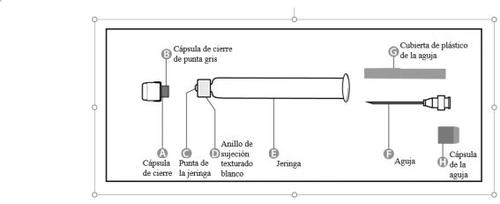
Paso 1: Segure com uma mão a seringa (E) com a cápsula de fechamento apontando para cima. Certifique-se de segurar a seringa pelo anel de sujeição texturado branco (D). |
|
Paso 2:Pegue com a outra mão a cápsula de fechamento (A) e incline-a firmemente para a frente e para trás para romper sua conexão com o anel de sujeição (D). Não gire nem dobre a cápsula de fechamento. |
|
Paso 3:Levante a cápsula de fechamento (A) e a cápsula de fechamento da ponta cinza acoplada (B) para removê-las. Tenha cuidado para não tocar a ponta da seringa estéril (C). |
|
Aplicação da agulha (estas instruções são válidas para as duas agulhas fornecidas):
Paso 1: Gire a cápsula de fechamento (H) de uma das duas agulhas idênticas para removê-la.Esta será a agulha utilizada para a reconstituição.Não remova a cobertura de plástico (G). |
|
Paso 2:Segure firmemente com uma mão a seringa (E) pelo anel de sujeição texturado branco (D). Insira com a outra mão esta agulha (F) e gire-a no sentido dos ponteiros do relógio até que encaixe. Uma vez bloqueada a agulha, retire sua cobertura de plástico (G). A seringa (E) já está pronta para uso. |
|
Instruções para a reconstituição de Rabipur utilizando a seringa pré-carregada:
A vacina deve ser inspecionada visualmente antes e após a reconstituição para detectar qualquer partícula estranha e/ou modificação do aspecto físico. A vacina não deve ser utilizada se for detectada qualquer alteração em seu aspecto. A vacina reconstituída é entre transparente e ligeiramente opalescente e entre incolor e ligeiramente rosa.
O pó para solução deve ser reconstituído com o dissolvente para solução fornecido, agitando a mistura com cuidado antes da injeção. A vacina reconstituída deve ser utilizada imediatamente.
Durante a fabricação, o frasco está selado ao vácuo. Portanto, para evitar problemas ao extrair a vacina reconstituída do frasco, após a reconstituição da vacina, recomenda-se desenroscar a seringa da agulha para eliminar a pressão negativa. Após isso, a vacina pode ser extraída facilmente do frasco. Não se recomenda induzir uma pressão excessiva, pois o excesso de pressurização criará problemas na extração da quantidade adequada de vacina.
A longitude da agulha não é suficiente para alcançar o fundo do frasco, por isso é necessário inverter o frasco e puxar para trás da agulha até aproximá-la do tampão. Isso permitirá extrair a totalidade da solução vacinal do frasco.
Após finalizar a reconstituição da vacina, retire a cápsula de fechamento da segunda agulha (tal como explicado no passo 1 para as agulhas) e substitua a agulha utilizada para a reconstituição pela segunda agulha, que será usada para a administração. Não utilize a mesma agulha para a reconstituição e para a administração.
- País de registo
- Substância ativa
- Requer receita médicaSim
- Fabricante
- Esta informação é apenas para referência e não constitui aconselhamento médico. Consulte sempre um médico antes de tomar qualquer medicamento. A Oladoctor não se responsabiliza por decisões médicas baseadas neste conteúdo.
- Alternativas a RABIPUR Pó e Solvente para Solução Injetável em Seringa Pré-carregadaForma farmacêutica: INJETÁVEL, 3.25 UISubstância ativa: rabies, inactivated, whole virusFabricante: Sanofi Winthrop IndustrieRequer receita médicaForma farmacêutica: INJETÁVEL, 60 microgramas/dose + 60 microgramas/doseSubstância ativa: respiratory syncytial virus vaccinesFabricante: Pfizer Europe Ma EeigRequer receita médicaForma farmacêutica: INJETÁVEL, 3,75 microgramasSubstância ativa: influenza, inactivated, split virus or surface antigenFabricante: Glaxosmithkline BiologicalsRequer receita médica
Alternativas a RABIPUR Pó e Solvente para Solução Injetável em Seringa Pré-carregada noutros países
As melhores alternativas com o mesmo princípio ativo e efeito terapêutico.
Alternativa a RABIPUR Pó e Solvente para Solução Injetável em Seringa Pré-carregada em Polónia
Alternativa a RABIPUR Pó e Solvente para Solução Injetável em Seringa Pré-carregada em Ukraine
Médicos online para RABIPUR Pó e Solvente para Solução Injetável em Seringa Pré-carregada
Avaliação de posologia, efeitos secundários, interações, contraindicações e renovação da receita de RABIPUR Pó e Solvente para Solução Injetável em Seringa Pré-carregada – sujeita a avaliação médica e regras locais.




